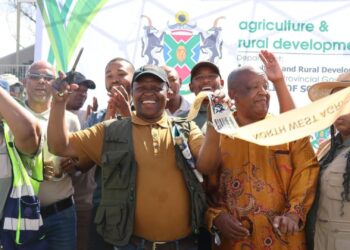As the country celebrates Heritage Day, Farmers nationwide reflected on what it means to them and their farming operations. With South Africa’s rich diversity and culture, farmers emphasised the importance of keeping the rich tradition of farming for future generations.
A fourth-generation farmer from Vrede in the Free State, Wessels Wessels, said it is critically important that heritage is celebrated, as it is a time to reflect on how far one has come.
“For me, as an elder farmer in my family, it means that I am the caretaker of the farm. It is only borrowed to me, and it is my responsibility to take care of the farm and build it for future generations. I am not here to eat the money and just to think of myself. Farming is just a way of life, not a goldmine.
“If one generation loses the farm, it will be lost forever,” he said.
Preserving culture
Mpumalanga maize and soya farmer Motshidisi Modise said heritage to her as a Sotho woman and farmer encompasses the cultural, natural, and historical aspects passed down through generations.
“As a farmer, heritage is tied to the land, agricultural practices, and the connection to ancestors who worked the land before us, the sacrifices they made for us and the teachings that passed on from agricultural practices to medicinal knowledge.
“The Sotho people’s history and identity are deeply rooted in our cultural heritage, which guides our daily lives and informs our values and traditions,” he said.
Kwazulu-Natal crop farmer Andile Mkhize said Heritage Day, to him, goes deep because it takes him back to his childhood, when he first fell in love with agriculture while helping his grandmother in her garden.
Related stories
- Why the VAT on sorghum is starving SA’s heritage
- Mother-daughter farmers cultivate heritage, not just crops
- Cheers to barley growers: NW farmers celebrated for dedication
- TVET colleges put agriculture at the heart of student development

“Those early mornings of planting, weeding, and harvesting were not just chores; they were life lessons that instilled in me patience, responsibility, and respect for the land.
“Beyond the personal, Heritage Day is a reminder of the importance of preserving our indigenous knowledge and food systems, because they carry our history and our DNA as a people,” he said.
Growing and honouring indigenous food
According to Mkhize, crops like amadumbe, ubhatata, and other traditional foods are more than just meals; they are a reflection of who we are, how our ancestors survived, and how our communities have always drawn strength from the land.
“As farmers, we carry the responsibility of not only producing food for today but also safeguarding these traditions for future generations.
“Heritage Day, for me, is about honouring that legacy, celebrating the resilience of our people, and reminding ourselves that agriculture is central to our heritage and our shared future as South Africans,” he said.
Vegetable farmer from Winterveld in Pretoria, Dineo Mphahlele, said as a young female farmer, heritage goes deeper and has a strong meaning not only for her but also for the community that she farms in.
“We grew up eating traditional food, but as we grow older and have entered the agriculture sector, I then understood how important it was to keep farming those crops that make that food, because we need to keep the history in our society,” she said.
READ NEXT: SA dairy industry tested by farmer losses and market challenges


















